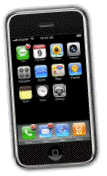
|
||||||||||||||||||||||||||||||||||||||||||||||||||||||
|
Twitter filled a personal gap that I created, unwittingly, a couple of weeks before I started using it. On February 27, with no announcement or fanfare, this blog switched from a mixture of long-form and short-form blog posts to all long-form. And then in March I started using Twitter, and it's become the place I use for short-form posts.
I have yet to figure out Facebook. Something about it doesn't make me want to go there often to find out what's new. Not sure why I'm not attracted to it and so many others are. PS: I seem to have discovered Twitter on March 14. Here's my first post. I clearly didn't understand it at the time (and said so). By Day 2 it's already starting to make sense. "What matters about Twitter, btw, is that people are using it." Throughout March and April are epiphanies on Twitter.
The tech press usually doesn't review products after a month of use, but that's when you really find out if it was worth the initial hype. The NY Times reports that iPhone sales are disappointing, I'd like to add that the product itself is disappointing. I still own and use a Blackberry for its email and web capabilities, both of which outshine Apple's product. Because the iPhone doesn't have a search command, and apparently doesn't store messages locally, it makes a poor choice for a mobile email client. For example, I brought only the iPhone with me to a meeting in Palo Alto last week. As I was driving to the meeting I could see that I would be a few minutes late, so I wanted to call the person I was meeting and alert them. With the Blackberry I would have been able to do this while stopped at a red light. Just search for the person's name in my inbox, open the first message, highlight the phone number, click the scroll wheel twice (once to dial the number, the second time to confirm that I want to do it). In comparison, the iPhone only keeps the most recent 25 messages in memory, and this person's email was not in that group. No search command. And it doesn't have a scroll wheel or a clipboard. The light turned green long before I found the email that contained the phone number. (Note: I've gotten a bunch of email saying the 25 can be increased to 200, which I have done. Thanks!) On the other hand, the iPhone is much prettier than a Blackberry and feels better in your hand. I'm not mocking Apple for that, style matters, esp in a personal device. But it seems they could have studied the competition more closely to produce a more feature-complete product. I still find the iPhone virtual keyboard difficult to use even after a month to get used to it. The Blackberry is very usable, in comparison. However, I like the way Apple did punctuation better than the Blackberry. It also seems we're going to have a long-term discussion over whether it makes sense to have a "mobile web" or take the iPhone trade-off, more effort to use its web (lots of scrolling and pinching), but making the whole web accessible, mobile sites or non-mobile sites. I think what Apple has attempted is noble, but it's not going to work. The screens have limited resolution, and even if they didn't, even if they could cram a billion pixels into every square inch, there's the limit of how much detail our eyes can see and how big our hands are. In other words, after almost a month of trying to make the iPhone view of the web work, I think there is such a thing as the mobile web. We're going to have to produce versions of websites specifically for devices with small screens. The other functions of the iPhone, the camera, YouTube, the photo browser, even the iPod functionality, are nice to have, but none of them work very well, and without a functioning web and email interface, they don't add much to the appeal of the iPhone. When all is said and done, it's a beautifully designed, colorful, very stylish, cell phone. A postscript -- how different the situation would be if the iPhone had a full SDK, if you could run Mac OS apps on the device, or if it had a built-in HTTP server that would allow you to browse or configure it over wifi from a Mac or Windows machine. In other words, if it had the kind of revolutionary features and was an open platform in the tradition of Apple and the PC industry. No doubt we'd be trying a dozen different approaches to email, at least one of them would be a clone of Blackberry email, as a holdover for the really great email products that would likely be coming. There's no doubt a lot of interest among developers in the iPhone, but it probably wil never be greater than it was in the first weeks the phone was released. More likely, the iPhone, if it attains success, will reach it the way the Mac did, after the initial fatal flaws are removed, in the "iPhone Plus" or whatever. Remember, in the 80s Apple was the first company to build networking into every machine, and later the first company to ship a wifi router. Hopefully it's possible for Apple to open today's iPhone, and reward the early adopters for betting on them, and get developers busy at fulfilling the opportunities it creates as a platform, not just a device. Peter Cook says we should look at the Nokia E70. Jackson Miller notes that there's lots about the iPhone today on the web. Amazing confluence. When I wrote my review I hadn't seen any of the other pieces, including a review comparing iPhone and Blackberry (!) by Mark Hendrickson on TechCrunch. Rex Hammock: "Wait a couple of generations before buying one." A NSFW comparison of the iPhone and the Nokia E70. |
Dave Winer, 52, pioneered the development of weblogs, syndication (RSS), podcasting, outlining, and web content management software; former contributing editor at Wired Magazine, research fellow at Harvard Law School, entrepreneur, and investor in web media companies. A native New Yorker, he received a Master's in Computer Science from the University of Wisconsin, a Bachelor's in Mathematics from Tulane University and currently lives in Berkeley, California. "The protoblogger." - NY Times.
"The father of modern-day content distribution." - PC World.
"Helped popularize blogging, podcasting and RSS." - Time.
"The father of blogging and RSS." - BBC.
"RSS was born in 1997 out of the confluence of Dave Winer's 'Really Simple Syndication' technology, used to push out blog updates, and Netscape's 'Rich Site Summary', which allowed users to create custom Netscape home pages with regularly updated data flows." - Tim O'Reilly.
My most recent trivia on Twitter. Comment on today's On This Day In: 2006 2005 2004 2003 2002 2001 2000 1999 1998 1997.
|
|||||||||||||||||||||||||||||||||||||||||||||||||||||
|
© Copyright 1997-2007 Dave Winer. Previous / Next |
||||||||||||||||||||||||||||||||||||||||||||||||||||||
 Another idea that's gaining maturity, and therefore perspective, is Twitter. It's now been almost five months since we fell in love with it. By "we" I mean a handful of people in the tech blogosphere, enough to create a critical mass of people to network with, enough so we can explore what it's like to have a spam-free pub-sub channel for direct communication.
Another idea that's gaining maturity, and therefore perspective, is Twitter. It's now been almost five months since we fell in love with it. By "we" I mean a handful of people in the tech blogosphere, enough to create a critical mass of people to network with, enough so we can explore what it's like to have a spam-free pub-sub channel for direct communication. Twitter also serves the purpose of what I used to call "email bulletins." When something newsworthy would happen, or if I wrote something special that I wanted a lot of people to read, I would push a bulletin to people who subscribed. Nowadays I push them to the 1539 people who
Twitter also serves the purpose of what I used to call "email bulletins." When something newsworthy would happen, or if I wrote something special that I wanted a lot of people to read, I would push a bulletin to people who subscribed. Nowadays I push them to the 1539 people who  Today's the 25th of July, the iPhone shipped on June 29, that's the day I got mine, so we're getting pretty close to the end of a month with the iPhone.
Today's the 25th of July, the iPhone shipped on June 29, that's the day I got mine, so we're getting pretty close to the end of a month with the iPhone. 

